2014年新目标新人教版《Unit11 How was your school trip Section A》七年级英语下册课件
新版人教新目标 初一下册 Unit 11 How was your school trip
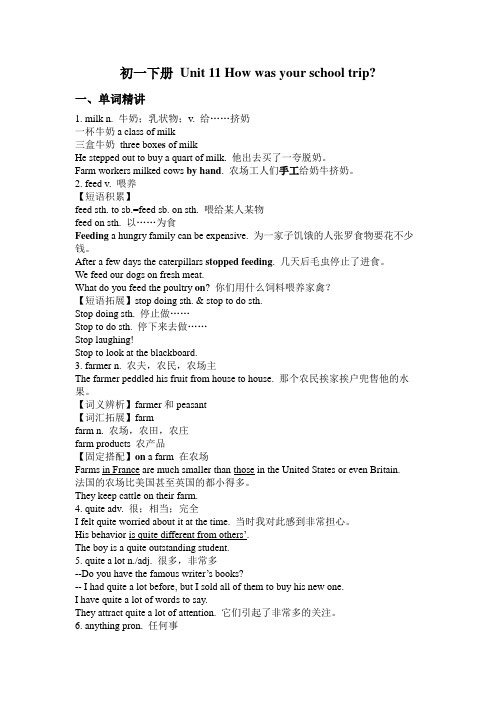
初一下册Unit 11 How was your school trip?一、单词精讲1. milk n. 牛奶;乳状物;v. 给……挤奶一杯牛奶a class of milk三盒牛奶three box es of milkHe stepped out to buy a quart of milk. 他出去买了一夸脱奶。
Farm workers milked cows by hand. 农场工人们手工给奶牛挤奶。
2. feed v. 喂养【短语积累】feed sth. to sb.=feed sb. on sth. 喂给某人某物feed on sth. 以……为食Feeding a hungry family can be expensive. 为一家子饥饿的人张罗食物要花不少钱。
After a few days the caterpillars stopped feeding. 几天后毛虫停止了进食。
We feed our dogs on fresh meat.What do you feed the poultry on? 你们用什么饲料喂养家禽?【短语拓展】stop doing sth. & stop to do sth.Stop doing sth. 停止做……Stop to do sth. 停下来去做……Stop laughing!Stop to look at the blackboard.3. farmer n. 农夫,农民,农场主The farmer peddled his fruit from house to house. 那个农民挨家挨户兜售他的水果。
【词义辨析】farmer和peasant【词汇拓展】farmfarm n. 农场,农田,农庄farm products 农产品【固定搭配】on a farm 在农场Farms in France are much smaller than those in the United States or even Britain. 法国的农场比美国甚至英国的都小得多。
新目标英语七年级下册讲义—Unit 11 How was your school trip

新目标七年级下册Unit 11 How was your school trip? 讲义一、重点单词k 挤奶2. cow .奶牛3. horse 马4. feed 喂养;饲养5. farmer 农民;农场主6. quite 相当;安全7. anything (常用于否定句或疑问句)任何东西;任何事物8. everything 一切;所有事物9. grow 种植;生长;发育10. farm 农场;务农;种田11. pick 采;摘12. excellent极好的;优秀的13. countryside 乡村;农村14. yesterday 昨天15. flower花16. worry 担心;担忧17. luckily 幸运地;好运地18. sun 太阳19. museum博物馆20. fire 火灾21. painting .油画;绘画22. exciting adj.使人兴奋的;令人激动的23. lovely可爱的24. expensive 昂贵的25. cheap 廉价的;便宜的26. slow缓慢的;迟缓的27. fast 快地(的)28. robot .机器人29. guide 导游;向导30. gift 礼物;赠品31. dark 黑暗的;昏暗的32. hear(heard)听到;听见自测表:二、短语归纳1.school trip 学校旅行2.go for a walk 去散步k a cow 给奶牛挤奶4.ride a horse 骑马5.feed chickens 喂鸡6.talk with 和......交谈7.take photos /a photo拍照st week上周9.ask some questions问一些问题10.quite a lot 相当多11.show sb. around sp.带某人参观某地12.learn about 了解13.grow strawberries种植草莓14.from...to... 从…到…15.pick some strawberries摘草莓16.take sth home带…回家17.climb the mountains 爬山18.visit my grandparents看望我的祖父母19.go fishing 去钓鱼20.so much 如此多的21.go to the zoo去动物园22.go to a farm去农场23a lot of fun很多乐趣24.play games 做游戏e out 出来26.go to the countryside去乡下27.science museum科学博物馆28.visit a museum 参观博物馆29.play chess with sb... 和…下棋30.buy sth for sb为某人买31.be interested in…对…感兴趣32.all in all总的来说33.not...at all 一点也不,根本不三、句型集萃1. How + be…? + like? ……怎么样?2. How do/does+主语+feel about...? 对......感觉如何?3. too many + 可数名词复数太多的……4.teach sb. how to do sth. 教某人怎样做某事5.quite + a / an + 形容词+可数名词单数= a + very + 形容词+可数名词单数一个相当/ 很……6.buy sth. for sb.=buy sb. Sth.为某人买东西7.It’s +形容词+to do sth. 做某事是......的8.sound+形容词听起来......四、词汇、句型讲解及拓展1.How was your school trip?学校旅行怎么样?【解析】How+be+主语?=What be+主语+like?意为“….怎么样?”★★★本句的答语:It was great./It was OK./It was/wasn’t good….【拓展】how是疑问副词,意为“怎么样,怎么”,用来构成特殊疑问句,主要用法如下:1)询问如何做某事,或者做某事方式。
人教新目标版英语七下Unit 11《How was your school trip》(Sectio

人教新目标版英语七下Unit 11《How was your school trip》(Section A 1a—1c)教学设计一. 教材分析人教新目标版英语七下Unit 11《How was your school trip》主要让学生通过学习和交流,掌握过去进行时态的用法,以及如何描述过去发生的事情。
本节课的主要内容是关于学生在学校旅行中的见闻和感受,通过听、说、读、写的方式,提高学生的语言运用能力。
二. 学情分析学生在学习本节课之前,已经掌握了基本的英语语法知识,具备一定的听、说、读、写能力。
但对于过去进行时态的运用,可能还存在一定的困难。
因此,在教学过程中,需要注重引导学生理解和运用过去进行时态。
三. 教学目标1.学生能够掌握过去进行时态的构成和用法。
2.学生能够通过听、说、读、写的方式,描述自己在学校旅行中的见闻和感受。
3.学生能够在真实情境中,运用过去进行时态进行交流。
四. 教学重难点1.过去进行时态的构成和用法。
2.如何引导学生运用过去进行时态描述过去发生的事情。
五. 教学方法1.情境教学法:通过设置真实的情境,让学生在实践中学习和运用过去进行时态。
2.任务型教学法:通过完成各种任务,引导学生积极参与课堂活动,提高语言运用能力。
3.互动式教学法:教师与学生、学生与学生之间的互动,激发学生的学习兴趣,提高课堂氛围。
六. 教学准备1.教学PPT:包含本节课的主要内容、图片、视频等。
2.教材:人教新目标版英语七下Unit 11。
3.录音机:用于播放听力材料。
4.教学卡片:用于操练和巩固所学内容。
七. 教学过程1.导入(5分钟)利用图片或视频展示学校旅行的场景,引导学生回忆学校旅行中的趣事,激发学生的学习兴趣。
2.呈现(10分钟)教师通过PPT呈现本节课的主要内容,包括单词、短语和句子。
同时,讲解过去进行时态的构成和用法,让学生初步感知和理解。
3.操练(15分钟)学生分组进行角色扮演,模拟学校旅行中的场景,用过去进行时态进行交流。
Unit11Howwasyourschooltrip(SectionB3a-SelfCheck)教学案(人教新目标七年级下册)
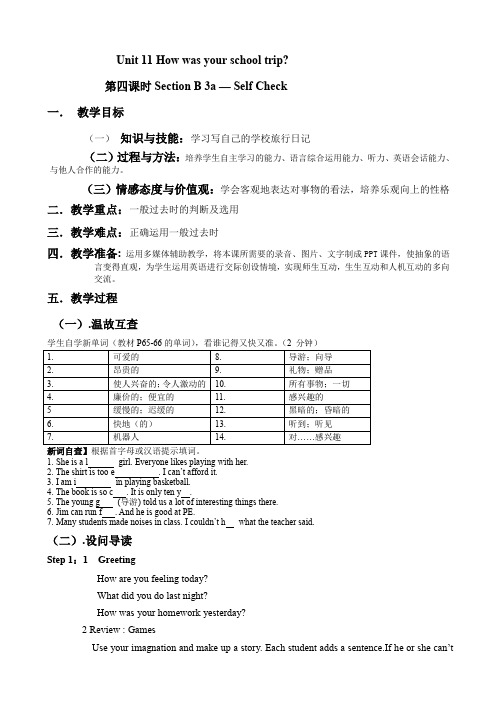
Unit 11 How was your school trip?第四课时Section B 3a — Self Check一.教学目标(一)知识与技能:学习写自己的学校旅行日记(二)过程与方法:培养学生自主学习的能力、语言综合运用能力、听力、英语会话能力、与他人合作的能力。
(三)情感态度与价值观:学会客观地表达对事物的看法,培养乐观向上的性格二.教学重点:一般过去时的判断及选用三.教学难点:正确运用一般过去时四.教学准备:运用多媒体辅助教学,将本课所需要的录音、图片、文字制成PPT课件,使抽象的语言变得直观,为学生运用英语进行交际创设情境,实现师生互动,生生互动和人机互动的多向交流。
五.教学过程(一).温故互查新词自查】根据首字母或汉语提示填词。
1. She is a l girl. Everyone likes playing with her.2. The shirt is too e. I can’t afford it.3. I am i in playing basketball.4. The book is so c . It is only ten y.5. The young g (导游) told us a lot of interesting things there.6. Jim can run f . And he is good at PE.7. Many students made noises in class. I couldn’t h what the teacher said.(二).设问导读Step 1:1 GreetingHow are you feeling today?What did you do last night?How was your homework yesterday?2 Review : GamesUse your imagnation and make up a story. Each student adds a sentence.If he or she can’tadd a sentence,he or she must sing an English song.Step 2 : Preparation1.3a Look a t the pictures of Bob’s school plete his diary entry.2. 3b Linda is Bob’s classmate. Complete her diary entry.Step 2 : Writing3c Now write a diary entry for your own school trip.Explain if you liked it or didn’t like it a nd why.Step 3 : Self-check1 Write more verbs and their past forms in each group.2 Complete the conversations with the correct forms of the verbs in the box.3 Check the answers4 Grammar: The Simple Past Tense(三)自我检测Mike’s summer vacationOn July 18th,2012, Mike and his parents went to Qingdao, a city in Shandong for summer vacation. Qingdao is a beautiful city with sea.It was about 12:00 when they arrived there on the first day. They found a hotel and had a short rest. It was really hot and they decided to go to the beach. At about 3:30 pm, they got to the beach. There were many people there. Some were lying on the beach and many children were playing in the water. Mike was playing with them and he was very happy. His parents also felt relaxed. About two hours later, they went back to the hotel.On the second day, it rained all day. Mike visited the history museum with his father and his mother went shopping.On July 20th, they went to Laoshan Mountain in the morning and took a bus home in the afternoon. They were tired but happy.( ) 1. Where did Mike’s family go on vacation? A. To Shanghai. B. To Tianjin.C. To Qingdao.( ) 2. What did Mike’s father do on July 19th?A. He swam in the sea.B. He visited the history museum.C. He went shopping with Mike’s mother.( ) 3.How long was their vacation? A. One day. B. Two days. C. Three days.( ) 4. How did they go back home? A. By train. B. By bus. C. By plane.( ) 5. Which of the following is true?A. It rained on July 19th.B. They went shopping on July 20th.C. Mike didn’t play in the water on the first day.(四).巩固训练:一、阅读理解。
人教新目标(Go for it)版Unit 11 How was your school trip-
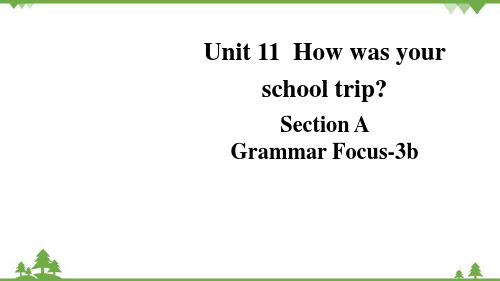
Irregular verbs
do is are have eat buy
did was were
had ate bought
定义 时间标志词
一般过去 时(一)
构成(动词的规则性和 不规则性变化) 句式结构
定义
一般过去时表示过去某个时间或某一段时间内发生 的动作或存在的状态,也可以表示过去的习惯或经 常发生的动作。一般过去时常和表示过去的时间状 语连用。
much fun.
A. have
B. had
C. are having
D. will have
Susan _____ a birthday card for me two days ago.
A. will buy
B. bought
C. buys
D. is buying
—_____ you _____ TV yesterday evening?
花
come out 意为“出现;露出”
We _a_t_e_ (eat) our 在lun含c有h 宾un语d从er句so的m主e 从tr复ee合s a句n中d , _p_l_a_y_e_d (play) some若g主am句e的s 时af态ter为t一ha般t.过B去ut时a,t a从bo句ut two o’clock, it _g_o_t通(g常et要) v用er相y应cl的ou过dy去a时n态d w。e _w_o_r_r_ie_d_ (worry) it would rain. Luckily, it _d_i_d_n_’_t
c.
或
后,-ed读
。如wanted,
needed.
⑤动词过去式的不规则变化规律:
类别
人教新目标版英语七下Unit 11《How was your school trip》(Sectio

人教新目标版英语七下Unit 11《How was your school trip》(Section B 2a)教学设计一. 教材分析人教新目标版英语七下Unit 11《How was your school trip》主要让学生通过学习关于学校旅行的相关话题,掌握一般过去时的疑问句和回答,以及如何描述过去的事情。
Section B 2a是一篇关于两个学生讨论他们学校旅行的对话,通过这篇对话,学生可以进一步理解一般过去时的运用,并能够运用所学知识进行实际对话。
二. 学情分析学生在学习本节课之前,已经掌握了一般现在时和一般过去时的基本结构,同时具备了一定的听说读写能力。
但对于如何运用一般过去时进行疑问句的提问和回答仍需加强练习。
此外,学生对于描述过去发生的事情还缺乏一定的词汇和表达方式,因此,在教学过程中,需要引导学生运用正确的词汇和句型进行描述。
三. 教学目标1.能听懂、会说、会读、会写关于学校旅行的相关词汇和句型。
2.能运用一般过去时进行疑问句的提问和回答。
3.能够描述过去发生的事情,并能够运用所学知识进行实际对话。
四. 教学重难点1.重点:掌握关于学校旅行的相关词汇和句型,运用一般过去时进行疑问句的提问和回答。
2.难点:如何引导学生运用正确的词汇和句型描述过去发生的事情。
五. 教学方法1.任务型教学法:通过设置各种任务,让学生在实际操作中运用所学知识。
2.情境教学法:创设各种情境,让学生在真实的环境中进行语言交流。
3.交际式教学法:引导学生进行小组讨论和对话,提高学生的口语表达能力。
六. 教学准备1.教学课件:制作与学校旅行相关的课件,包括图片、视频等。
2.教学道具:准备一些与学校旅行相关的实物道具,如地图、照片等。
3.练习册:准备与本节课相关的一般过去时的练习题。
七. 教学过程1.导入(5分钟)利用图片或视频引入学校旅行的主题,激发学生的兴趣,引导学生谈论他们曾经的学校旅行经历。
2.呈现(10分钟)展示2a的对话,让学生听懂对话内容,然后老师讲解对话中的重点词汇和句型。
Unit 11 How was your school trip人教版新目标七年级下册英语优秀教学设计 初一教案有教学反思
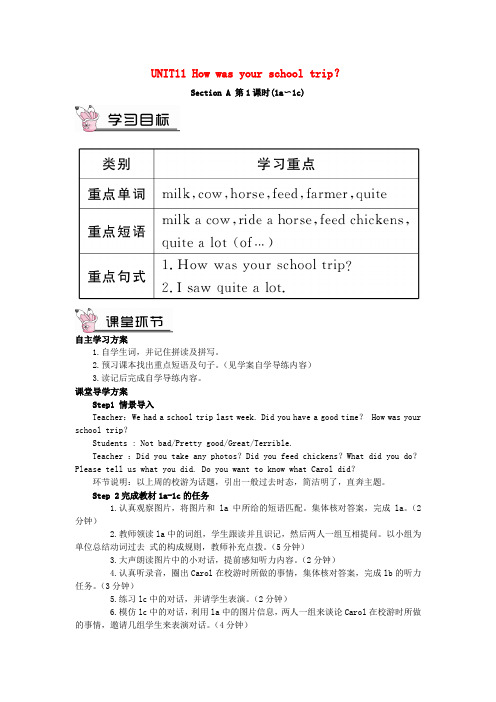
UNIT11 How was your school trip?Section A 第1课时(1a〜1c)自主学习方案1.自学生词,并记住拼读及拼写。
2.预习课本找出重点短语及句子。
(见学案自学导练内容)3.读记后完成自学导练内容。
课堂导学方案Step1 情景导入Teacher:We had a school trip last week. Did you have a good time? How was your school trip?Students : Not bad/Pretty good/Great/Terrible.Teacher :Did you take any photos?Did you feed chickens?What did you do?Please tell us what you did. Do you want to know what Carol did?环节说明:以上周的校游为话题,引出一般过去时态,简洁明了,直奔主题。
Step 2完成教材1a-1c的任务1.认真观察图片,将图片和la中所给的短语匹配。
集体核对答案,完成la。
(2分钟)2.教师领读la中的词组,学生跟读并且识记,然后两人一组互相提问。
以小组为单位总结动词过去式的构成规则,教师补充点拨。
(5分钟)3.大声朗读图片中的小对话,提前感知听力内容。
(2分钟)4.认真听录音,圈出Carol在校游时所做的事情,集体核对答案,完成lb的听力任务。
(3分钟)5.练习lc中的对话,并请学生表演。
(2分钟)6.模仿lc中的对话,利用la中的图片信息,两人一组来谈论Carol在校游时所做的事情,邀请几组学生来表演对话。
(4分钟)参考案例:A:Did Carol take any photos?B:Yes,she did. /No,she didn’t.7.小结训练。
(4分钟)(1)— What did Sam do on the farm?—He B chickens.A feedsB fedC grows(2)— C you to the zoo last Sunday?—No,I didn'.A. Do;goB. Are;going C . Did;go环节说明:听说结合,第一时间向学生传达语言目标,结对对话练习和小结训练,使语言目标得以强化。
人教新目标版英语七下Unit 11《How was your school trip》(Sectio

人教新目标版英语七下Unit 11《How was your school trip》(Section B 2b)教学设计一. 教材分析人教新目标版英语七下Unit 11《How was your school trip》(Section B 2b)主要讲述了四个同学分享他们学校旅行的经历。
本节课的主要语言点是过去式的疑问句和回答,以及一些表示旅行经历的词汇和短语。
通过本节课的学习,学生能够听懂、会说、会读、会写与旅行经历相关的句子,并能够运用所学知识进行简单的交流。
二. 学情分析七年级的学生已经掌握了一定的英语基础知识,能够听懂、会说、会读、会写一些简单的英语句子。
但是,对于过去式的疑问句和回答的运用还有一定的困难,需要通过大量的练习来巩固。
此外,学生对于一些表示旅行经历的词汇和短语还不够熟悉,需要在教学中进行引入和讲解。
三. 教学目标1.学生能够听懂、会说、会读、会写与旅行经历相关的句子。
2.学生能够运用过去式的疑问句和回答进行简单的交流。
3.学生能够掌握表示旅行经历的词汇和短语。
四. 教学重难点1.过去式的疑问句和回答的运用。
2.表示旅行经历的词汇和短语的掌握。
五. 教学方法1.任务型教学法:通过设定具体的情境,让学生在完成任务的过程中运用所学知识。
2.交际法:通过师生之间的互动,生生之间的交流,让学生在实际的语言环境中学习英语。
3.情境教学法:通过图片、视频等媒体手段,为学生创设真实、生动的情境,提高学生的学习兴趣。
六. 教学准备1.教学课件:制作与本节课内容相关的课件,包括图片、视频等媒体素材。
2.学案:为学生准备学习任务单,包括旅行经历的相关问题。
3.黑板:准备黑板,以便在课堂上进行板书。
七. 教学过程1.导入(5分钟)利用图片或视频展示不同类型的旅行,引导学生谈论自己的旅行经历,激发学生的学习兴趣。
2.呈现(10分钟)展示本节课的主要内容,让学生听懂四个同学分享旅行经历的故事。
在呈现过程中,引导学生关注过去式的疑问句和回答,以及表示旅行经历的词汇和短语。
人教新目标英语七年级下Unit 11 How was your school tripSection

Unit 11 How was your school trip?Section B(2a-self check)导学案(第四课时)【学习目标】1. 复习并学习形容词,能区分褒义词和贬义词,能够通过阅读短文使学生学会如何使形容词进行评论,怎样发表自己感想。
并学会使用一般过去时态写日记。
2. 单词和短语:exciting, lovely, expensive, cheap, slow, fast, robot, guide, gift, everything,interested, dark, hear【学习过程】一、课前预习翻译下列短语或语块:1. go on a school trip___________________2. get there _____________________3. 慢的←→快的______________4. 昂贵的←→便宜的_____________5. 下棋____________________6. 坐火车_____________________7. model robot _______________ 8. 对…感兴趣_________________9. 总的说来__________________ 10. not…at all ___________________11. see sth.along the way________________ 12. teach sb. how to do sth. ____________13. teach sb. how to do sth _______________ 14. on the slow trian________________二、课上活动阅读理解1. 2a下列单词描述好事情还是坏事情?好事情打√,坏事情打×。
如果两种意思都有,留着空。
interesting ___ difficult ___ lovely___ slow___ exciting___boring___ cool ___ hot ___ lucky ___ large___ expensive __terrible ___ delicious ___ great ___ cheap ___ fast___2. 速读。
人教版新目标版七年级英语下册 Unit 11 How was your school trip Period 4教案
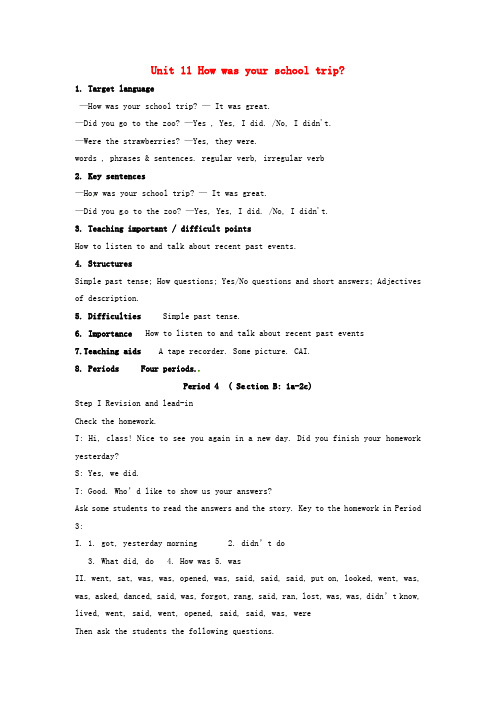
Unit 11 How was your school trip?1. Target language—How was your school trip? — It was great.—Did you go to the zoo? —Yes , Yes, I did. /No, I didn't.—Were the strawberries? —Yes, they were.words , phrases & sentences. regular verb, irregular verb2. Key sentences—Ho w was your school trip? — It was great.—Did you g o to the zoo? —Yes, Yes, I did. /No, I didn't.3. Teaching important / difficult pointsHow to listen to and talk about recent past events.4. StructuresSimple past tense; How questions; Yes/No questions and short answers; Adjectives of description.5. Difficulties Simple past tense.6. Importance How to listen to and talk about recent past events7.Teaching aids A tape recorder. Some picture. CAI.8. Periods Four periods.Period 4 ( Se ction B: 1a-2c)Step I Revision and lead-inCheck the homework.T: Hi, class! Nice to see you again in a new day. Did you finish your homework yesterday?S: Yes, we did.T: Good. Who’d like to show us your answers?Ask some students to read the answers and the story. Key to the homework in Period 3:I. 1. got, yesterday morning 2. didn’t do3. What did, do4. How was5. wasII. went, sat, was, was, opened, was, said, said, said, put on, looked, went, was, was, asked, danced, said, was, forgot, rang, said, ran, lost, was, was, didn’t know, lived, went, said, went, opened, said, said, was, wereThen ask the students the following questions.T: What did your parents do yesterday?S1: My mother did some reading and my father watched TV.S2: My fathe r played computer games and my mother helped me with my English.S3: My parents went to visit one of their old friends.T: OK! Look at the pictures. Could you tell me what Lucy did yesterday?S1: She watched TV yesterday.S2: She cooked at home yester day.S3: She cleaned the car with her friends yesterda y.S4: She studied geography yesterday.Help to answer and read the new word geography.Step II Reading and writing (1a, 1b)1. Ask the students to match the words with the pictures in 1a.T: Jim studied geography yesterday, too. He also did other things. Now open your books and turn to page 56. Look at the pictures in 1a. Read the words and then write the letter of each picture in the blank in front of the correct phrase.Check the answers.T: Right. Now ask and answer in pairs, using the question: What did Jim / Sally do yesterday?Sample conversations:1) S1: What did Jim do yesterday?S2: He did his homework.2) S3: What did Sally do yesterday?S4: She played the guitar.2. Ask the students to draw a happy fa ce or an unhappy face under each picture. Help to answer.S: No. I think doing homework is an unhappy thing.T: What about playing the guitar?S: It’s a happy thing.T: In Picture b, the boy played the guitar. It w as fun. The happy face shows it was fun. Now please draw a happy face or an unhappy face under each picture a, c and d.Check the answers.Step III Listening (2a)1. Ask the students to listen to the conversation Sally and Jim and write the answers in the chart.Check the answers.Play the recording and ask the following questions.T: First, what did Sally do last weekend?S1: She stayed at home and did lots of things. She cleaned her room and did her homework. And on Sunday, she went to the library.T: Good. What about Jim? What did Jim do last weekend?S2: He played soccer on Saturday morning. On Sunday afternoon, he went to a movie. On Sunday night, he visited his friend’s house.2. Ask t he students to repeat after the recording line by line and try to write them down.T: I will play the recording twice again. First repeat after the recording and then try to write the conversations down.Step IV Pairwork (2b, 2c)1. Ask the students to read the dialogue first. And then make a conversation.2. Ask the students to talk about what they did last weekend.3. Then ask the students to write down what they did last weekend.T: OK. You did very well. No w please write down what you did last weekend.Give the students two or three minutes to write.Step V Homework1. Ask the students to do Exercise 6 in the workbook.2. Ask the students to write something about what they did last week.。
人教新目标版英语七下Unit 11《How was your school trip》(Sectio
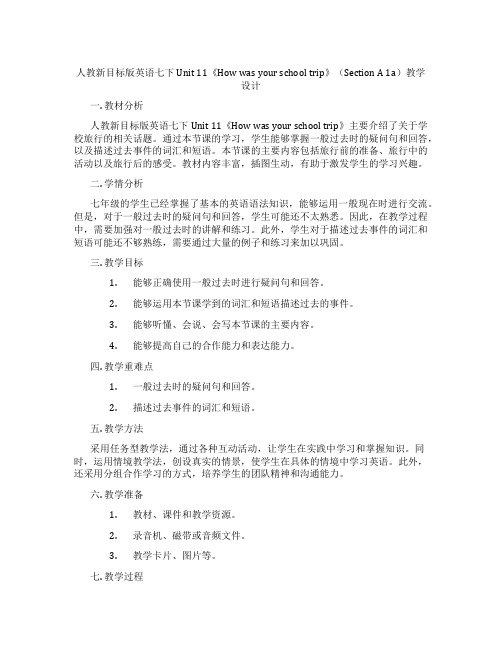
人教新目标版英语七下Unit 11《How was your school trip》(Section A 1a)教学设计一. 教材分析人教新目标版英语七下Unit 11《How was your school trip》主要介绍了关于学校旅行的相关话题。
通过本节课的学习,学生能够掌握一般过去时的疑问句和回答,以及描述过去事件的词汇和短语。
本节课的主要内容包括旅行前的准备、旅行中的活动以及旅行后的感受。
教材内容丰富,插图生动,有助于激发学生的学习兴趣。
二. 学情分析七年级的学生已经掌握了基本的英语语法知识,能够运用一般现在时进行交流。
但是,对于一般过去时的疑问句和回答,学生可能还不太熟悉。
因此,在教学过程中,需要加强对一般过去时的讲解和练习。
此外,学生对于描述过去事件的词汇和短语可能还不够熟练,需要通过大量的例子和练习来加以巩固。
三. 教学目标1.能够正确使用一般过去时进行疑问句和回答。
2.能够运用本节课学到的词汇和短语描述过去的事件。
3.能够听懂、会说、会写本节课的主要内容。
4.能够提高自己的合作能力和表达能力。
四. 教学重难点1.一般过去时的疑问句和回答。
2.描述过去事件的词汇和短语。
五. 教学方法采用任务型教学法,通过各种互动活动,让学生在实践中学习和掌握知识。
同时,运用情境教学法,创设真实的情景,使学生在具体的情境中学习英语。
此外,还采用分组合作学习的方式,培养学生的团队精神和沟通能力。
六. 教学准备1.教材、课件和教学资源。
2.录音机、磁带或音频文件。
3.教学卡片、图片等。
七. 教学过程1.导入(5分钟)通过展示一张美丽的旅行图片,引导学生谈论自己最喜欢的旅行。
同时,询问学生是否曾经去过某个地方,引导学生思考一般过去时的用法。
2.呈现(10分钟)展示本节课的主要内容,包括旅行前的准备、旅行中的活动以及旅行后的感受。
通过图片、卡片等形式,呈现本节课的重点词汇和短语。
3.操练(15分钟)采用分组合作的方式,让学生进行角色扮演,模拟旅行中的各种情景。
人教新目标版英语七下Unit 11《How was your school trip》(Sectio

人教新目标版英语七下Unit 11《How was your school trip》(Section B 2a)教案一. 教材分析《人教新目标版英语》七下Unit 11主要讨论关于学校旅行的经历。
Section B 2a是一个阅读材料,描述了两个学生对于他们学校旅行的不同看法。
通过阅读这个材料,学生可以了解和练习一般过去时的被动语态。
本节课的目标是通过阅读和讨论,提高学生的阅读理解能力和语言运用能力。
二. 学情分析七年级的学生已经掌握了基本的英语语法和词汇,对于一般过去时和被动语态有一定的了解。
他们在学习过程中,需要通过大量的练习来提高语言运用能力。
同时,他们对于学校旅行这样的主题比较感兴趣,可以通过讨论和分享,激发他们的学习兴趣。
三. 教学目标1.能够理解并朗读课文2a。
2.能够通过阅读和讨论,掌握一般过去时的被动语态。
3.能够运用所学知识,描述自己的一次学校旅行经历。
四. 教学重难点1.重点:通过阅读理解,掌握一般过去时的被动语态。
2.难点:如何运用一般过去时的被动语态,描述自己的学校旅行经历。
五. 教学方法采用任务型教学法,通过阅读、讨论、分享和实践,激发学生的学习兴趣,提高他们的语言运用能力。
六. 教学准备1.课文2a的复印件或幻灯片。
2.与学校旅行相关的图片或视频。
3.一份学校旅行的计划或经历。
七. 教学过程1.导入(5分钟)通过提问,引导学生回忆自己的一次学校旅行经历。
例如:“你们有没有去过什么有趣的地方?”、“你最喜欢学校旅行的哪个部分?”等。
2.呈现(5分钟)向学生展示课文2a,并让学生独立阅读。
在阅读过程中,引导学生关注一般过去时的被动语态。
3.操练(10分钟)让学生两人一组,互相练习使用一般过去时的被动语态,描述自己的学校旅行经历。
教师可以提供一些关键词或句子结构,帮助学生进行练习。
4.巩固(5分钟)通过小组讨论,让学生分享彼此的学校旅行经历。
鼓励他们使用一般过去时的被动语态进行描述。
2014年新目标人教版七年级英语下册unit 11 How was your school trip section A 1a-1c导学案
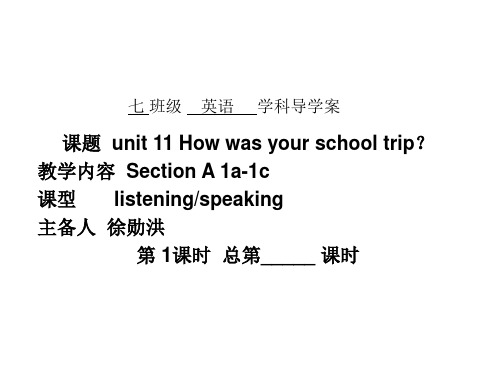
1b Listen and circle the three things Carol did on her school trip in 1a.
1.went for a walk 2. milked a cow 3.rode a horse 4. fed chickens 5.talked with a farmer 6. took some photos
【展示交流、个性呈现】 1c Ask and answer questions about Carol’s school trip.
A: Did Carol take any photos? B: Yes, she did. A: Did she ride a horse? B: No, she didn't.
milk a cow,talk with a farmer, feed chickens, go for a walk
【展示交流、个性呈现 】 Yesterday Carol and her friends was great. They had a school trip. It ___ go to the zoo.They ____ went to a didn't ___ farm. They went there by bus . Carol saw some cows . She milked _____ _____ a cow. But she didn't __ ride a horse . She saw some chickens, but she didn't _____ feed them. What else _____ did _____ they do ? walk around the They went for a _____ farm and talked _____with a farmer.
人教新目标七年级英语下册课件Unit 11 How was your scho

A. walks
B. walk
C. walking
D. walked
zxxkw
2. Mrs. Black is in the kitchen. She __D____
dinner for her family.
A. prepares B. prepares
C. preparing D. is preparing
C. going
D. went
根据句意, 用括号中所给单词的正确形式填 空。
1. Jack always __g_e_ts____ (get) up early in the morning. 2. My brother isr_u_n_n_zxix_kwn_g(run) outside now. 3. The child __s_a_w___ (see) his old friend on the way home yesterday. 4. __D__id__ he __g_o___ (go) fishing last weekend?
zxxkw
the museum very much. I am not really interested in bicycles. I like computers more. Also, there were too many people at the museum, and they were very noisy. The museum restaurant was expensive, too. I hope we can go to a computer museum next year.
zxxkw
It was great.
zxxkw
zxxkw
人教新目标版七年级英语下册Unit11HowwasyourschooltripSectionB3a_Self_Check教案新版
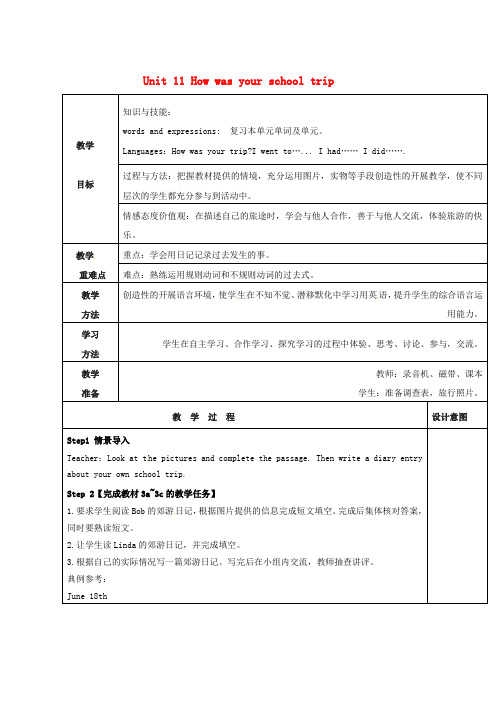
A. something B. everything C. nothing D. anything
4.I meant to show my grandparents _____ the city.
A.around B. to C. in D. /
Step 4 Homework
Step 2【完成教材3a~3c的教学任务】
1.要求学生阅读Bob的郊游 日记,根据图片提供的信息完成短文填空。完成后集体核对答案,同时要熟读短文。
2.让学生读Linda的郊游日记,并完成填空。
3.根据自己的实际情况写一篇郊游日记。写完后在小组内交流,教师抽查讲评。
典例参考:
June 18th
I went to the farm with my teachers and my classmates. On the farm, we saw many animals, like cows, chickens, sheep and so on. We also helped the farmers feed chickens and milk t he cows. We also took some photos with the animals. We ate with the farmers on the farm. The food was all very delicious. I bought some eggs for my mother fro m the farmers. We were all very happy.
Unit 11 How was your school trip
教学
目标
知识与技能:
- 1、下载文档前请自行甄别文档内容的完整性,平台不提供额外的编辑、内容补充、找答案等附加服务。
- 2、"仅部分预览"的文档,不可在线预览部分如存在完整性等问题,可反馈申请退款(可完整预览的文档不适用该条件!)。
- 3、如文档侵犯您的权益,请联系客服反馈,我们会尽快为您处理(人工客服工作时间:9:00-18:30)。
巧记一般过去时
动词一般过去时,表示过去发生事; be用was或用were, have, has变had; 谓语动词过去式,过去时间坐标志; 一般动词加-ed,若是特殊得硬记。 否定句很简单,主语之后didn’t添; 疑问句也不难,did放在主语前; 如果谓语之前有did,谓语动词需还原; 动词若是was,were,否定就把not添。
I went ____ to the countryside. Did you go to the zoo? ____ No, I didn’t.
2a Listen and check the questions you hear.
√ √
√ √
What did the farmer say? Did you grow any apples? What did you see? Do they grow apples? Did you learn anything? Did you eat them? Did you ask him any questions? Were they good?
2d Role-play the conversation.
Peter: Hi, Eric. How was your trip last week? Eric: It was excellent. I visited my grandparents in the countryside. Peter: Oh, nice. What did you do? Eric: I went fishing every day. And I fed the chickens with my grandpa. It was so much fun.
2b Listen again. Circle T for true or F for false. 1 The farmer showed Carol around the farm. T F 2 Carol learned a lot about farming. T F 3 The farmers grow strawberries from December to June. T F 4 The farmers don’t grow apples. T F 5 Carol picked some strawberries and took them home. T F
What did they do ___ last weekend? Theypicked ______________________ some strawberries. How were ____ the strawberries? They were delicious.
What did you do last month?
Grammars :
一般过去时
一、 一般过去时的概念
表示过去某个时间或某一段时间内发 生的的动作或存在的状态,常和表示 过去的时间状语连用,如 yesterday,last night, in1990,two days ago 等。一般过去式也表示过去经常 或反复发生的动作,常和often,always 等表示频度的时间状语连用。
What did he/she do yesterday?
took some photos
go for a walk
went for a walk
talk with a farmer
talked with a farmer
1a Match the phrases with the pictures. went for a walk e milked a cow b rode a horse a fed chickens c talked with a farmer f took some photos d
2c Ask and answer questions about Carol’s visit to the farm. A: What did Carol do? B: She picked some strawberries.
A: How was your school trip? B: It was … (boring/interesting/good/great…) A: What did you do on the school trip? B: I went for a walk with my classmates.
Peter: Sounds good. How was the weather there? Eric: It was great, and the air was so clean. I watched the stars at night. They were so beautiful. Peter: Lucky you.
were did went fed ate rode said got took learned learnt
写出下列动词的过去式。
不规则动词 go went ride rode do did is was are were have had eat ate buy bought see saw 规则动词 pick picked visit visited watch watched climb climbed study studied worry worried play played live lived stop stopped
Unit 11 How was your school trip?
Section A
2014年2月14日 1
Phrases
milk a cow
go for a walk
ride a horse
talk with a farmer
take some photos feed chickens
What do you do every day?
talk with a farmer stay at home watch the stars play tennis
1b Listen and circle the three things Carol did on her school trip in 1a.
went for a walk milked a cow rode a horse fed chickens talked with a farmer took some photos
四注意,y变成ied,特殊形式特殊记。
2.不规则动词的过去式需特殊记忆。 was am(is) are(是) could do/does(做,干) can(能) had have (has)(有) go(走) came feed (喂) come(来) bought eat(吃) buy (买) grow(生长) grew ride (骑) ran run(跑) say (说) saw see (看见) get(变得,到达) taught take(带) teach(教) swim(游泳) swam learn(学习) 详见课本P142页
Did you......yesterday? Yes,I did./No,I didn't.
play basketball watch TV
play computer games
Did he/she......yesterday? Yes, he/she did. No,he /she didn't.
1. Did you see any cows? Yes, I did. I saw quite a lot.
quiet a lot (相当多)+of+可数或不可数, 也
可以单独使用。
quite a little 相当多+不可数名词
quite a few 相当多+可数名词
e.g. 我们喝了不少牛奶。 We drank quite a lot of milk. 我看到了相当多的奶牛。 I saw quite a lot of cows. 夏天我经常打网球。 I play tennis quite a lot in the summer. 不少学生迟到了。 Quite a few students were late.
肯定句:I rode a horse last Sunday. (1) (2) 否定句:I didn‘t ride a horse last Sunday. 一般疑问句: Did you ride a horse last Sunday? 肯定回答:Yes, I did. 否定回答:No, I didn't. 特殊疑问句: (1)What did you do last Sunday? (2)When did you ride a horse?
三、动词过去式的构成
清念 /t/, 元浊/d/;
1. 规则动词的过去式 /t/ /d/ 之后念/id/ 1) 一般情况下,在动词原形后面加-ed。 2)以不发音e结尾的动词,在词尾直接加-d。 3)以重读闭音节(即辅音+元音+辅音)末 尾只有一个辅音字母的动词,要先双写这个 辅音字母后,再加 –ed。 4)以“辅音字母+ y”结尾的动词,先将 y 改为 i, 再加 –ed。 口诀:一加ed,二加d,三要双写,
(3)一般疑问句:Was/Were + 主语 + 其它? 肯定回答:Yes,主语+ was / were . 否定回答:No,主语+ wasn’t /weren’t. (4)特殊疑问词+was/were+主语+其他?
肯定句:The air was clean yesterday. 否定句:The air wasn't clean yesterday. 一般疑问句: Was the air clean yesterday? 肯定回答:Yes, it was. 否定回答:No, it wasn't. 特殊疑问句:How was the air yesterday?
